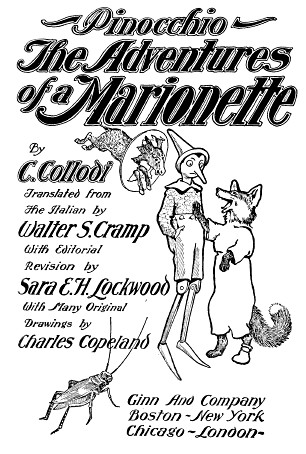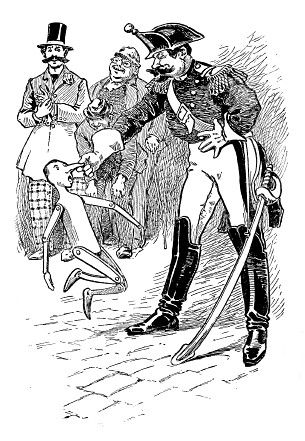 |
|
||
| Kellscraft
Studio Home Page |
Wallpaper
Images for your Computer |
Nekrassoff Informational Pages |
Web
Text-ures© Free Books on-line |
|
THE ADVENTURES
OF PINOCCHIO
 by C. Collodi Translated from the Italian by Walter S. Camp With Editorial Revision by Sara E. H. Lockwood With Many Original Drawings by Charles Copeland Boston – New York Chicago -- London 1904  PREFACE CHAPTER 1 How it happened that Master Cherry, carpenter, found a piece of wood that wept and laughed like a child. CHAPTER 2 Master Cherry gives the piece of wood to his friend Geppetto, who takes it to make himself a Marionette that will dance, fence, and turn somersaults. CHAPTER 3 As soon as he gets home, Geppetto fashions the Marionette and calls it Pinocchio. The first pranks of the Marionette. CHAPTER 4 The story of Pinocchio and the Talking Cricket, in which one sees that bad children do not like to be corrected by those who know more than they do. CHAPTER 5 Pinocchio is hungry and looks for an egg to cook himself an omelet; but, to his surprise, the omelet flies out of the window. CHAPTER 6 Pinocchio falls asleep with his feet on a foot warmer, and awakens the next day with his feet all burned off. CHAPTER 7 Geppetto returns home and gives his own breakfast to the Marionette CHAPTER 8 Geppetto makes Pinocchio a new pair of feet, and sells his coat to buy him an A-B-C book. CHAPTER 9 Pinocchio sells his A-B-C book to pay his way into the Marionette Theater. CHAPTER 10 The Marionettes recognize their brother Pinocchio, and greet him with loud cheers; but the Director, Fire Eater, happens along and poor Pinocchio almost loses his life. CHAPTER 11 Fire Eater sneezes and forgives Pinocchio, who saves his friend, Harlequin, from death. CHAPTER 12 Fire Eater gives Pinocchio five gold pieces for his father, Geppetto; but the Marionette meets a Fox and a Cat and follows them. CHAPTER 13 The CHAPTER 14 Pinocchio, not having listened to the good advice of the Talking Cricket, falls into the hands of the Assassins. CHAPTER 15 The Assassins chase Pinocchio, catch him, and hang him to the branch of a giant oak tree. CHAPTER 16 The Lovely Maiden with Azure Hair sends for the poor Marionette, puts him to bed, and calls three Doctors to tell her if Pinocchio is dead or alive. CHAPTER 17 Pinocchio eats sugar, but refuses to take medicine. When the undertakers come for him, he drinks the medicine and feels better. Afterwards he tells a lie and, in punishment, his nose grows longer and longer. CHAPTER 18 Pinocchio finds the Fox and the Cat again, and goes with them to sow the gold pieces in the Field of Wonders. CHAPTER 19 Pinocchio is robbed of his gold pieces and, in punishment, is sentenced to four months in prison. CHAPTER 20 Freed from prison, Pinocchio sets out to return to the Fairy; but on the way he meets a Serpent and later is caught in a trap. CHAPTER 21 Pinocchio is caught by a Farmer, who uses him as a watchdog for his chicken coop. CHAPTER 22 Pinocchio discovers the thieves and, as a reward for faithfulness, he regains his liberty. CHAPTER 23 Pinocchio weeps upon learning that the Lovely Maiden with Azure Hair is dead. He meets a Pigeon, who carries him to the seashore. He throws himself into the sea to go to the aid of his father. CHAPTER 24 Pinocchio reaches the CHAPTER 25 Pinocchio promises the Fairy to be good and to study, as he is growing tired of being a Marionette, and wishes to become a real boy. CHAPTER 26 Pinocchio goes to the seashore with his friends to see the Terrible Shark. CHAPTER 27 The great battle between Pinocchio and his playmates. One is wounded. Pinocchio is arrested. CHAPTER 28 Pinocchio runs the danger of being fried in a pan like a fish CHAPTER 29 Pinocchio returns to the Fairy's house and she promises him that, on the morrow, he will cease to be a Marionette and become a boy. A wonderful party of coffee-and-milk to celebrate the great event. CHAPTER 30 Pinocchio, instead of becoming a boy, runs away to the Land of Toys with his friend, Lamp-Wick. CHAPTER 31 After five months of play, Pinocchio wakes up one fine morning and finds a great surprise awaiting him. CHAPTER 32 Pinocchio's ears become like those of a Donkey. In a little while he changes into a real Donkey and begins to bray. CHAPTER 33 Pinocchio, having become a Donkey, is bought by the owner of a Circus, who wants to teach him to do tricks. The Donkey becomes lame and is sold to a man who wants to use his skin for a drumhead. CHAPTER 34 Pinocchio is thrown into the sea, eaten by fishes, and becomes a Marionette once more. As he swims to land, he is swallowed by the Terrible Shark. CHAPTER 35 In the Shark's body Pinocchio finds whom? Read this chapter, my children, and you will know. CHAPTER 36 Pinocchio finally ceases to be a Marionette and becomes a boy
Under
the assumed name of C. Collodi, Carlo Lorenzini is well known to the
reading
world of Italy. His most successful book, Pinocchio, was written for
children,
and has already become a classic. Of all the fairy stories of Italian
literature this is the best known and the best loved. The name of the
marionette hero is familiar in every household of northern and central
Italy.
In its whimsical extravagance, its quaint humor, and its narrative
style the
story appeals strongly to both old and young. American
children, who have long delighted in French and German fairy tales, and
among
whom Hans Christian Andersen is universally beloved, should not remain
in
ignorance of this Italian classic. The Florentines call it a literary
jewel,
and as such it should be known to all young readers. In order to
preserve the
unique flavor of the story as much as possible the translator has
followed the
original rather closely. Pinocchio's waywardness and love of mischief
are fully
set forth, and the moral, though sufficiently obvious, is not allowed
to
detract from the enjoyment of his adventures. The
story is one that readily lends itself to the fertile fancy and
skillful pencil
of an able illustrator. In the present volume, as in the original, the
pictures
play an important part which is not likely to be overlooked by the
readers for
whom the book is designed. |